Displaying items by tag: Peter Malone's Movie Reviews
Jump, Darling

JUMP, DARLING
Canada, 2020, 90 minutes, Colour.
Cloris Leachman, Thomas Duplessie, Andrew Bushell, Sheldon McIntosh.
Directed by Phil Connell.
Jump, Darling is a brief Canadian film. It is notable as the last film for veteran Oscar-winning actress (The Last Picture Show), Cloris Leachman, in her early 90s.
She plays Margaret, the elderly grandmother, living alone, not wanting her daughter to put her in a home. But the main character in this story is Russell, played by Thomas Duplessie, having trained to be an actor, but finding that he is very much at home performing as a drag Queen. And, at the opening of the film, he is breaking up with his longtime boyfriend who has found someone else.
The main part of the story is his returning home to his grandmother, his relationship with her, caring for her, also taking money from her, cheques,, doing the shopping for her, cooking. He is emotionally upset because of the separation from his boyfriend. Relationship with his mother, her arriving each month trying to persuade her mother to go to the home, their visiting the home in an upsetting episode.
He visits the local clubs, does some singing, encounters the manager of the city club where he worked and walked out, has a dilemma about leaving his grandmother or not, returning to the city, and demanding to perform.
And the film leaves Margaret, alone, quietly remembering the past, hoping for death.
- The title? Expectations?
- The Canadian setting, the city, clubs, apartments? The range of countryside? The home and interiors? The local clubs? The musical score?
- Russell’s story, age, background, orientation, relationship with his father and memories, relationship with his mother, training as an actor, hopes for a career, drag Queen, skill, performance, satisfaction, in the city, walking out, returning home, the breakup with Justin, with his grandmother, her age, health, staying with her, helping her, but taking her money? Is mother’s visit? His dilemmas, performances in the town, reactions, from friends? Meeting the manager of the bar in the city, the return, his demands, preparation, performance? His future?
- The portrait of Margaret, Cloris Leachman in her 90s, her story, background of her husband, tensions with her daughter, her daughter’s visit, her not wanting to go into care? Her bond with Russell? Welcome him, the time with him, his care for her, her response, her attitudes towards his taking the money? Her daughter’s visits, clashes, the visit to a home? Her not wanting to go? Russell and his departure, the finale, her health, her memories, wishing to die?
- Russell’s mother, the tension in the relationship, memories of the past, her concern about her mother, wanted her to go into care? The visit to Justin to talk about the relationship?
- The clubs, the drag Queens, the range of performances, the star with the beard, in the cities, local? The gay clubs, the patrons, men and women? The performances?
- A sympathetic picture of men like Russell?
Godless: the Eastfield Exorcism
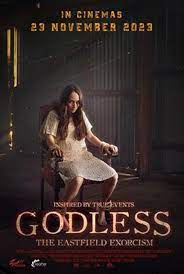
GODLESS: THE EAST FIELD EXORCISM
Australia, 2023, 91 minutes, Colour.
Georgia Eyers, Dan Ewing, Tim Pocock, Rosie Traynor, John Wood, Eliza Matengu.
Directed by Nick Kozakis.
This is an interesting, small-budget exorcism film. Filmed in Victoria, Daylesford and Hepburn’s Springs, it is based on an actual story that took place in western Victoria, Antwerp, north of Dimboola, in 1993.
After seeing and the film, it is well worthwhile googling the true story to find how accurate, in so many ways, this fictional version is.
Exorcism became very popular in cinema with 1973’s The Exorcist, then its sequels, its prequel is, and the many imitations, some very serious, some parodies. There have been Catholic exorcism films, Protestant exorcism films, Evangelical exorcism films.
The setting for this film is an Evangelical country community, led by an enthusiastic woman, Barbara (Rosie Traynor), some opening scenes of vigorous prayer and enthusiasm. One of the congregation is Ron, Dan Ewing, a farmer, more recently married, concerned about his wife, Lara (Georgia Eyers). They are seeing a therapist, Lara anxious, then rather sceptical – and there are a number of sequences with discussions against medication, vaccines, anti-fluoride, scepticism of science and medication.
Lara begins to manifest strange behaviour, dancing motions, naked, but also with some hallucinatory experiences, memories of the past, and some diabolical manifestations. Barbara recommends Daniel King (Tim Pocock), an Evangelical exorcist, not beholden to the Vatican or other authorities.
Ron is wary but accedes to an exorcism. Daniel is rather smug, self-centred, equating himself with God in his power to cast out Demons. The exorcism scenes are vivid, Daniel physically brutal and assaulting Lara, psychological bullying, God-focused demands that the Demons come out of her. Many of the local church are invited to be present and to pray.
Later in the film, there are flashbacks to explain Lara’s condition, an accident, did child and husband.
Ultimately, Daniel is so violent that Lara dies. And he then switches the experience into a hoped-for resurrection, that she will rise from the dead. The local police (John Wood from Blue Healers) comes to the scene along with the therapist. When Lara does not rise again, Daniel’s interpretation is that it is better for her to be alive with God rather than suffering on earth.
Final information concerns the rest of the principals, their trials, suspended sentences – which correspond with what happened to the protagonists in the experiences of 1993.
- Based on a true story, episodes in western Victoria, 1993?
- The popularity of the exorcist in films since the 1970s? Catholic variations? Protestant and Evangelical variations?
- The title, the implication about the evangelical believers, faith, self-appointed exorcist’s?
- The setting, the town, the farm, the citizens, the police, the small church, the congregation? The musical score?
- Lara and Ron, their marriage, the visit to Dr Walsh, the therapy, the discussions, Lara and her response, her imagination? Ron, wary, sceptical of medicine? The return visit, Dr Walsh’s diagnosis of schizophrenia?
- The religious community, Evangelical, Barbara as leader, prayer and enthusiasm, singing, copies of the Bible? Ron and his place? His concern about Lara, the discussions with Barbara, her wanting to help, her faith? Her belief in Dan, his reputation?
- The community and their wariness of science, injections, drugs, fluorides poisoning?
- Lara, the implications of mental illness, schizophrenia? But the film showing her having images, satanic creatures? Going to Dr Walsh, her belief in her? Not wanting the exorcism, her being confined, Ron and his attitude, her being bound, trying to escape, in the barn, Dan’s arrival, taking over?
- The dramatising of the exorcism? Dan, seeing himself as God’s instrument, seeing himself almost as God? His behaviour, the religious language, echoes of exorcisms, compelling the Demons to? His brutality, violence towards Lara? Verbal abuse? His diagnosis, demands of the Demons to leave? Extending the ceremonies, inviting the group in, their Bibles, their prayer, the range of characters and their beliefs? The impact on Lara? Ron, his beliefs, his doubts, concern for Lara?
- The sympathetic member of the community, being told off by Dan, her going to see Lara, getting Dr Walsh’s card, phoning her? Lara, the broken Charlotte, getting loose, in the woods, the pursuit, her demonic experiences?
- The buildup to the end, the flashbacks, her marriage, devoted husband, the baby, the joy, driving, the destruction, the crash, her being rescued, helpless, the baby dying, her husband burnt? The mould of the footprint, then smashing it? Her able to use it to break free?
- The buildup to the final violence, Dan in his intensity, the aftermath, the blood, Lara dead? The reaction of the group? Ron and his grief? Dan and his reaction, twisting the situation, predicting that Lara would rise from the dead in three days?
- The day of the resurrection, the police chief, pass relationship with the group, driving Dr Walsh, Dr Walsh’s reaction to Lara’s death, trying to talk with Ron, with Dan?
- The failure of the resurrection, Dan and his twist that Lara in heaven was better than Lara suffering on Earth?
- The after information, the arrests, the trials, the suspended sentences? (Which happened actually in 1993.)
- Audiences, belief in devil possession, exorcisms, or not? Issues of faith, rituals, interpretation of the Scriptures? Exorcist, officially appointed, self-proclaimed?
Just a Farmer
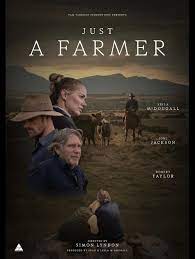
JUST A FARMER
Australia, 2023, 104 minutes, Colour.
Leila McDougall, Susan Prior, Joel Jackson, Robert Taylor, Oliver Overton, Vivian McDougall, Damian Walshe-Howlin, Trevor Jamieson, Louise Siversen.
Directed by Simon Lyndon.
There is something sad in hearing the dismissive phrase about someone, “Just a…”. This is a small but effective Australian film focusing on rural life and issues of mental health. In fact, at the beginning and end of the film, there is the urging for anyone anxious to contact Lifeline or Beyond Blue.
The power behind the film is Leila McDougall, a teacher, a farmer’s wife, with her husband establishing Rule Live in 2014, concerned about mental health and farmers, with the alarming statistic of the number of farmers who do commit suicide each year, interviewing many people and deciding to write the screenplay. She plays the central character, Alison, and much of the filming was done at the family property in Tatyoon, Victoria (including the sequence in the actual local Uniting Church), and many of the locals acting in the film, and local farm equipment used throughout.
Joel Jackson plays Alec, farmer, initial signs of some depression, working with his alcoholic father, Owen, veteran actor Robert Taylor, memories of his growing up, care for his wife, 12-year-old son and little daughter. Soon into the action film, he kills himself.
The screenplay takes up the themes of stoic continuing with life almost as if the tragedy had not happened, Alison persevering with the tasks around the farm. The children are sad, somewhat withdrawn, the boy lashing out during a local football match. Owen continues his drinking at the pub, sad memories of his dead wife in the past, suffering a stroke.
Another theme, as you would expect and hope, is that of how whoever is suffering can unburden themselves, talk to someone, talk to someone who is empathetic, Alison relying on her sister who has come to help, finding a listening ear in the woman who runs the local pub. And, the importance of the mother talking with her children, listening to her children, enabling them to express their sorrow and puzzle.
This is a topical film, made with insight and compassion, a contribution to awareness of Australian mental health.
- The title, the tone, merely a farmer?
- The initial warnings concerning Lifeline and Beyond Blue? Repeated at the end? The concern about mental health, farmers, suicides, consequences for families?
- The setting, the farm, the actual farm and farmhands performing, the actual machinery? The vistas of the countryside, the cattle, the sheep, the shearing? Fences, rescuing sheep? The sheepdogs? Barns, equipment, need for repairs? Authentic atmosphere? Musical score?
- The opening comment by the son, with his parents, the happiest days of his life, parents on horses, the roundup of the cattle, the boy and his sister driving, playing together?
- The portrait of the family, Alec, working hard, the property, his father and drinking, bringing him home from the pub, their talks, Alec less sociable, his worries, his desk, taking medication? The buildup, sympathy, 20 minutes in and his hanging himself?
- Alison, love for her husband, the children, domestic scenes, talking with her sister, her father-in-law and his help on the farm, drinking? The search for her husband, finding him dead? The impact, stoic, keeping to herself, not talking with the children, continuing on with the work, daily life, with the farmhands, the discussion about repairs to the machinery, the neighbour, Oliver, borrowing his harvester? The sister’s arrival, the house in disarray, her cleaning it, cooking? The meals?
- The screenplay not immediately giving indications of Alex’s motives, the desk, the documents, his medication? His moods? The gossip at the football match, the sister confronting the women, Alice and confronting them? The sister asking Oliver, no affair?
- Owen, father to Alec, grandfather, hard work on the farm, his physical state, the pub, yarns and swearing, friends, Jackie managing the pub? Bringing him home, continually drinking the cans, concern about his heart? Quietly sitting, the image of his wife on the tree? The story of her heart attack? The later revelation of the truth, suicidal, the crash, the baby in the car? Owen and his stroke, hospital, Alison devoted to him? The return home, with the grandchildren, giving up the drink?
- Children, the young girl, drawing, playing, devotion? The boy, 12 years old, school, football, the fight and bullying during the match, morose, love for his father, no talking about his death, hard work on the farm?
- Alison, bonding with her sister, able to talk, the sister’s encouragement?
- Alison going to talk to Jackie, able to unburden herself, the puzzle of not talking, the importance of talking with someone sympathetic, therapy? Farmers and wary of therapy, the reference to “shrinks” by Owen? Alison facing up to it? Talking with her children, inviting them to talk about their experience, hurt, guilt?
- Realistic portrait of life on a farm, the actual farm, the local Uniting Church, the minister and his words? Stock, crops and hay, harvesting, weather, machinery, finance?
- In the final poetic words and reflection?
One Perfect Match
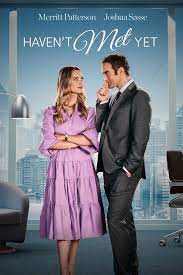
ONE PERFECT MATCH
Australia, 2023, 87 minutes, Colour.
Merritt Patterson, Joshua Sasse, Lynn Gilmartin, Meg Fraser, Callan Colley, Charlotte Chimes, Claire Weller Price, Mitchell Bourke.
Directed by Jo-Anne Brechin.
A Date Movie. Literally. The title is that of a company that places people, dates and match, more personable than trawling a date site.
87 minutes of unremitting niceness. Not a harsh word, not a rude word heard throughout. Everyone and everything, even date meals which do not work out, is nice. Everything is “amazing” or “cool”. This is what a perfect kind of Hallmark movie portrays as a lovely world. Sweetness and light.
Lucy (Merritt Patterson) began and her manages her client-filled One Perfect Match Company, a matchmaker listening perfectly and arranging dates. Within minutes of the start of the film, she encounters Finn (Joshua Sasse), a charmingly reticent Clark Kentish type (with Superman potential).
We know exactly what is going to happen, love at first sight, but can the matchmaker date a client? Lots of references to ethical considerations and professionalism, despite the urgings of Ella, her sister, and her ever-ready assistant, Paige. Ella is about to be married – and lots of lovely coincidences concerning Chardonnay, a beautiful vineyard location for a wedding…
While set in the US, this is an Australian production, filmed in Brisbane, from the Steve Jaggi company which has specialised in this type of romance, sometimes Americans flying to Queensland and finding romance there. The leading character is a Canadian actress, the leading man English. All the supporting cast are Australian.
A nice and pleasantly undemanding film for Romantics who want to sit back, relax and be charmed.
- , The company, Lucy and her work, meeting with Finn, the romance?
- An Australian production, the Florida settings, international cast, Australian support?
- A G-rated film, nice characters, no harshness, pleasant situations, positive outlook?
- Lucy’s story, the company, the title, her clients, contact with them, learning about them, placing them with dates and matches, personal contact? Page as her support of assistant? Ella and her marrying? Ella concerned about Lucy not having dates?
- The encounter with Finn, the restaurant, the Chardonnay, coincidences, his being a client, placing him with Molly, the tour of his building, the attraction, her professionalism, not dating a client, despite page and Ella? The coincidence for Ella’s wedding, the Vineyard, the visit, meeting his mother, the tour of the property? Continued meetings? The not-date for the ceremony? Learning that he was not a client any more? The wedding, happy ending?
- Finn, reserved, his story, his father and business, his business studies, investments, successful company, clients? His father in Italy, his mother and the Vineyard? The visit of Lucy and Ella, showing Lucy the property? The date with Molly, her awkwardness, love for cats, his love for dogs, polite, breaking the match? The wedding, the happy ending?
- The pleasant supporting characters, page of the office concerned about Lucy, Ella and her fiance, preparations for the marriage, the property and the site, the happy wedding? Finn’s mother and her gracious welcome? Molly, client, the pleasant break with Finn? Lucy and her dinner with Colin, not compatible, suggesting: two Molly?
- Pleasantly undemanding?
Cabrini
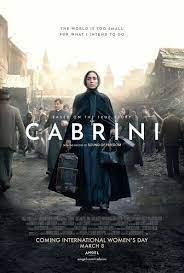
CABRINI
US, 2024, 145 minutes, Colour.
Cristiana Dell'Anna, David Morse, John Lithgow, Giancarlo Giannini, Jeremy Bobb, Romana Maggiora Vergano, Patch Darragh.
Directed by Alejandro Monteverde.
Cabrini – Frances Xavier Cabrini, born in Lombardy in 1850, on mission to New York, 1889, 28 years of enterprising activity, died 1917, beatified 1938, canonised 1946, the first American citizen to be canonised.
Frances Xavier Cabrini established a religious congregation, the Missionary Sisters of the Sacred Heart, whose motto is taken from St Paul: “I can do all things in him who strengthens me.”. 40 minutes into this portrait of Mother Cabrini, we hear her say these words. And, by this stage of the film, we know that this is true. But, there are almost 2 more hours or – an extraordinary extension of “all things”.
The tone is set in the prologue, a young boy, Paolo, close-up on his face, dragging a wheelbarrow, his mother dying of typhus, the New York streets, his calling out for help, in Italian, everybody ignoring him, a policeman accosting him, giving an address where the sick woman could be taken, but she dies. Paolo will later appear in this story.
Then the transition to Italy, a young woman in a religious habit, close-up of her face, the camera dwelling for a long time on her face, inviting us to respond. Throughout the film, the camera will focus on Mother Cabrini’s face, mostly intense, often sad, rarely smiling, but absolutely determined in her goals, and in her confidence on God’s Providence. And she often states that if you begin the mission, the means will come.
Frances Cabrini had a dream of establishing orphanages in China, a compassion for needs in Asia. She has been refused by Vatican officials, eventually visiting Rome, demanding a meeting with Pope Leo XIII, (Giancarlo Giannini) his acceeding to her wish, cup of tea together, his being impressed by her zeal, and the suggestion of a mission in New York. She and her sisters travel, steerage, her looking out on the Atlantic, her fear of water, flashbacks to her almost drowning, being rescued, recovery, but permanent damage to her lungs. Which means that she sees any time not devoted to her mission as, simply, loss.
Mother Cabrini is played by Italian actress, Cristiana Dell’Anna, always intense, an intense interiority, no histrionics. This is a determined woman of faith, the language of faith (though no scenes of prayer and community – and one might have expected some emphasis on her Sacred Heart devotion, though some glimpses of statues and paintings.)
Filmgoers who remember Martin Scorsese’s Gangs of New York, will resonate at the reconstruction of Five Points, built on sewers, squalor, many Italian migrants, not yet speaking English, and despised by so many of the locals, called dagos, guinea pigs, seen as less than human, insulted in the streets, denounced by the local authorities, wooden shacks, but youngsters taking refuge in the underground tunnels and channels, put to menial jobs, often in physical danger. Mother Cabrini goes instantly into action, rescuing children, encountering a young prostitute and clashes with her vicious pimp, continually finding accommodation, looking for buildings, looking for support.
There are many scenes of her confrontations with the Archbishop of New York, Archbishop Corrigan (David Morse), Irish background, reluctant to help Mother Cabrini, urging her to return to Italy, but her continually confronting him. Then there are the local powers, the mayor, John Lithgow portraying him as supremely arrogant, politicians and police under his control, the local police who despise the Italians, ride roughshod over a crowd gathered at an Italian festival in a park.
Mother Cabrini is of strong Italian stock, strong Italian attitudes (and grew up in strong anti-clerical times), ready to confront anyone, Archbishop, Mayor… When she enlists the help of an opera singer, moved by Pagliacci, he refuses because of his antagonism towards the church. When she organises a children’s choir to serenade him at his mansion, he relents, joining in the fundraising. Despite opposition and setbacks, her forte was in persuading people to support her. And her mission forte was the continued outreach, confident in her outreach.
In the 19th century, while women did not have a place in church governance, there were many strong women who ran hospitals, schools, exercising this kind of church leadership. This is to the fore in this screenplay, Mother Cabrini and being a pioneer in feminism, the film’s dialogue uses convincing feminist language to highlight the power of women: the Mayor suggesting she should have been a man, Mother Cabrini replying that men cannot do what women can do.
The screenplay indicates what was to come, orphanages, but, especially after a deadly subway explosion, the need for hospital, the beginning of Cabrini hospitals in many parts of the world. Despite political sanctioned arson, she keeps going. Final close-up of her, intense, determined, her interior confidence in divine Providence, and the information given about what she referred to as her “Empire of Hope”, 67 institutions, her congregation and its outreach throughout the world.
A cinema biography in the long traditional style of such stories, moving, challenging audience compassion.
- Audience knowledge of Frances Cabrini? Italians? Americans? Worldwide? Her being a significant American figure? Her work in New York, the US, worldwide? The first American citizen to be canonised?
- The impact of this characterisation of mother Cabrini, as a person, intense, determined, a sense of mission, ambitions for China, thwarted by the Vatican, the Pope’s suggestion to go to New York, the squalid situations in New York, her pushing forward, conflict with the Archbishop, with the civil authorities, with the Mayor? Her vision, concerned for the poor and children, her entrepreneurial skills, her trust in Providence?
- The opening, Paolo, the wheelbarrow, calling out in Italian, his dying mother, people ignoring him, the gentry? Looking down on Italians, Italian language? The policeman and the destination? Is mother’s death? The intense close-up of his face? His later appearance, with Enzo, in the canals, the support from Mother Cabrini, the situation with Victoria, the pimp, the gun, his father’s suicide gun, Mother Cabrini and the burning of the gun?
- The status of Italians in the US, in New York, the initial information, the numbers, 1890 to 1910, not speaking English, hopes, menial jobs, looked down on as inferiors, day goes, guinea pigs…?
- The focus on Frances Cabrini, the initial focus on her face, intense close-up? The background of her life, the flashbacks to the drowning sequence, the paper boat with leaves symbolic of the mission, her rescue, the damage to her lungs, health prognosis, her not wanting to waste time, wasting time as a loss? With her sisters, the establishing of the group, their work, the orphanage in Lombardy? Her ambitions to go to China for orphanages?
- The letter from the Vatican, her trip, the Cardinals and denial, hostility? A woman? And none? Demanding to see the Pope, his seeing her, cup of tea, chat, the proposal for New York? Her accepting this, the voyage to the US, steerage, the arrival, the priest not there to meet them, walking, the night, the squalor of Five Points, the swamps, the sewers? Seeing the little girls, touching Mother Cabrini? Finding some shelter with the prostitute, barring the door against the pimp? Is banging on the door, his threats?
- The film’s perspective on the character of Mother Cabrini? Italian background, tradition of shrewdness, capacities for success? But the actress and a non-histrionic performance? Often silent, rarely smiling, absolutely determined, long extreme close-ups of her?
- Her intensity and the speed of her work, finding accommodation, poor, cramped, her health and awake at night, pursuing the boys down the sewer hole, the little girls, gathering the children? Finding means to provide shelter, food, clothes? Local support? American hostility?
- The visit to the Archbishop, his Irish background, not pleased to see the nuns in New York, urging them to return? The letter from the Pope? The Archbishop strictures, and their not appealing to Americans for financial support? The later meetings with the Archbishop, her going to Rome, the further letter from the Pope? The Archbishop meet here at the wharf? His support yet his continued strictures? This portrait of an Archbishop, his reference to the people under his care, his selective care, for the wealthy and middle class? Racial issues?
- The encounters with Victoria, the young prostitute, her story of her life, the pimp, and giving the nun shelter, his violence against her, his coming to see the nuns and threatening them? The encounter with Paolo, the shooting? The confrontation of Victoria, her getting a knife, killing him? Victoria and her continued work with mother Cabrini, assisting with the work, finding a new life?
- The role of the police, attacks, the authorities, checking on health situations, evictions? Paying fines?
- Her focus on orphanages and children? The explosion underground, the many killed and wounded, and so and polo finding him, Enzo’s death? Mother Cabrini and her friendship with Dr Murphy, the first encounter, his volunteering, his advice, his advice to her for her health? Discussion about providing a hospital?
- Providence, the belief in beginning the mission and the means will follow? The search for buildings, the Archbishop and the Jesuit land, the lack of water, the digging of wells, Victoria and her eventually getting water? The building for the hospital, the raising of funds? The Archbishop and his forbidding sources for charity? The choice of the building, the poster for Pagliacci, her going to the opera, the interview with the singer, his anti-church attitudes? The children’s choir, serenading him, change of heart, his singing at the Italian Festival? The joy of the festival in the park?
- The role of the police, dispersing of the crowd, the money collected and the authorities saying that that was exactly the amount for the fine?
- Mother Cabrini going to Rome, her approach to the senator, to the Senate, her being rebuffed, rebuked is a woman, going to the senate house, defying the members, her speech, appeal, challenge to the presiding senator? Her return to America, her contacts?
- The local board, decisions, finance, the beginning of the renovation of the building? The hard work, her supervision, the workers? The fire, arson, the destruction?
- Her visit to the Mayor, his arrogant manner, his previous discussions with his officials, anti-Italian, receiving Mother Cabrini, their discussions, the verbal interchanges, his backing down, his saying that she should have been a man – and her reply that men cannot do what women do?
- The further information about her work, hospitals, throughout the US, the map and showing her work beyond America? Her death, living to 67 despite the ill-health prognoses? Beatification 1938, canonisation 1946, patron of immigrants?
Total Control 3
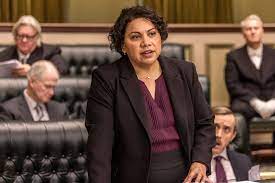
TOTAL CONTROL/ SERIES 3
Australia, 2024, 6 x 60 minutes, Colour.
Deborah Mailman, Rachel Griffiths, Rob Collins, Wayne Blair, Wesley Patten, Huw Higginson, Anthony Hayes, Steph Tisdell, Benedict Hardie, Rosie Lourde, Lisa Hensley, Jozef Beer, Catherine McClements, Fayssal Bazzi, Maya Stange.
Directed by Wayne Blair, Jub Clerc.
The first series of Total Control made such an impact in 2019 that in 2021 the second series went to air on the ABC. Deborah Mailman as Alex Irving, politician, the central character, won many awards. Rachel Griffiths was a strong presence. There were dramatic complications about First Nations people, Alex and her life in Queensland, in Parliament, dependence on Rachel, their clashes. This was developed in the second series, also developing the relationship between Alex and her brother Charlie, Rob Collins, leading to strong tensions. There was also the relationship between Alex and her son, Eddie, Wesley Patten. And there was a great deal of political conflict.
This is taken for granted in the third series, Alex initially seen in Queensland, with her new advisor, very patient and sympathetic Jolie, Steph Tisdell. Alex is campaigning, challenging the government for floods in the North. This sets a pattern for her behaviour throughout this series, as an independent in the House of Representatives, outspoken, always challenging, confronting the new prime minister of a minority government, played by Wayne Blair (who also directed three episodes). She clashes with her brother Charlie, now married, his wife expecting, his working for the prime minister on policy and documents.
And, there is the continuing relationship, friendly and hostile, with Rachel, the latter wanting an alliance of independent members, difficulties in finance, possibilities of corruption, investigative journalist with threats. And there is the continued concern of Alex for her son, his being in Canberra, at a special school, involved in protests against racism, planning to be an exchange student.
There is also the issue of Alex’s health, her incessant work, collapse, surgery, secrecy.
The fifth episode is well worth seeing, parliamentary sitting, Alex warning the prime minister that she would be a threat, proposing amendments, the cause of social justice for the young, trapping the prime minister and his relentless advisor, Sharon, Lisa Hensley, getting the support of the boisterous leader of the opposition, Anthony Hayes, only to outwit him to get support for further amendments which the government is forced to accept.
One of the best of Australian television series.
- The title, Alex, have Total Control of herself?
- The popularity of the series, Australian life, society, First Nations people, politics, corruption, Canberra?
- The value of the miniseries, six hours to develop characters and themes?
- Deborah Mailman as Alex Irving? The three series? The origins, her journey, Queensland, aboriginal, the past, relationship with her mother, crisis and her mother appearing to her, her relationship with Charlie, relationship with her son, Eddie? The opening, the floods in Queensland, the need for aid, government inaction? Her visit, her assistant, representations to the government? Political will? The intervention of the Queensland government, opening the Winton Medical Centre, the irony of her mother and illness, delayed, her death?
- Alex, her age, career, ups and downs, out of the Senate, House of Representatives, relationship with Rachel over the years, relationship with Paul? Paul as Prime Minister, First Nations, minority government, the crossbench, the Greens? Alex and her associations? Her courses, youth justice, the arguments with Paul, the dinner with him and her family, clashes with Charlie? Relationship with the opposition leader, using him, outwitting him? Her reliance on Jolie, price, the bond, the talk, Alex not wanting Jolie to pester her? Her health situation, secretive, the discussions with the doctor, the need for an operation, going to Queensland, the secrecy, collapse, her relationship with Dominic, driver and security, his challenging her – confidant, the later evening, dancing, the kiss? Alex has driven, her moods, strict mother, advised to be free with her son?
- Rachel, the past, her leadership, losing government, the crossbench? Forming the alliance? The think tank? Nick and his influence? Matt, the opposition, her wanting to influence him? Her relationship with Alex, up and down, the visit for to discussions? Lobbying for boats? Rachel and the encounters with Marian, the interview, the material for the article, Rachel wanting the injunction, collaboration with the Greens, the think tank, the finances? Kathleen, the discussion, Helena, wanting to support? Her being the source of Marian’s information? Kathleen hacking Marian? Rachel and the confrontation? Rachel and her voting record? Peter and his advisory role, constant? Alex and her anger with Rachel, Rachel saying she was not above suspicion? Alex justifying herself and abandoning Rachel?
- Paul, Prime Minister, aboriginal background, political savvy, the minority government, personal involvement, strengths and weaknesses? The parliamentary sittings and abuse?) Sharon, tough attitudes, advice, strategies? The relationship with Alex, the conflicts? Alex challenging? Charlie, his job, writing, the deadlines, policies? Charlie and his outburst against Paul, the aftermath? Alex and her visits, the threats, the setting of the house of parliament, her amendments, Paul being trapped?
- The picture of the opposition, the gung ho leader, his abuse of parliamentarians, the Speaker correcting him? Conservative, his following? Supporting Alex, a new amendments, his being trapped, his eyes harsh attitudes towards youth? The walkout of his members who did not support him? Matt, principals, urged by Rachel, the rebel group, part of the alliance?
- Eddie, his age, Queensland background, life and friends, at home there? In Canberra, the school, private school, the students? Skipping school, friends, elitist groups? His protesting, the bigoted security guard, filming him, his being arrested, Alex ambushed by the media? Her reaction? Taking him to Queensland? Her not telling him about her health? The friend whom he supported with the filming, the police, going to the party, Charley driving them home, drinking, drunk, sick? Supported by Dee? Her pregnancy, waters breaking, driving her to the hospital, his presence, support, calling the baby Eric? His wanting to be an exchange student, the decision coming through, Iceland? His demanding honesty from his mother?
- Charlie, relationship with Alex, family, in Canberra, the previous attack on Alex and himself, the stabbing, the racist attack, the court case, the racists interview and apology? Charlie and his relationship with Dee, her pregnancy, nice couple, her professionalism, his job, the deadlines, the timing, policies? Phone calls with Alex? His outburst against Paul? His decision to go to therapy, the meetings? Late for the birth? Decisions about the future, haven’t Dee and her job, going back to Winton, the possibilities of New York?
- Jolie, the big woman, motherly, advisor and confidante to Alex, Rachel offering her the job, concerned about Alex’s health? Thank advice? The final decision about parliament?
- The Parliamentary sequence, the Speaker getting ready, the formalities, the rowdiness and the Speaker intervening? The issue, the amendments, the reactions, Alex and her presentation, having the floor, Paul and Sharon, the opposition initially supporting, Alex outwitting them, her speeches, the divisions, the press response? The success? The press and the accusations of corruption? Her collapse?
- The issue of corruption, Marion in her article, the accusations against Helena, her resigning? Rachel offering supply? Marian leaving the confidential dossier for Alex? The press conference and her honesty, the final confrontation with Rachel? The alliance, and Matt announcing Alex as leader?
- The finale, Alex talking to camera, about aboriginal leadership, accusations and challenges to the audience?
You'll Never Find Me
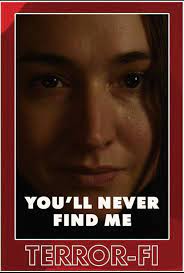
YOU'LL NEVER FIND ME
Australia, 2023, 96 minutes, Colour.
Brendan Brock, Jordan Cowan.
Directed by Josiah Allen, Indiana Bell.
For audiences who enjoy a thriller with atmosphere of suspense, mystery, suggested violence with some violent overtones, You’ll Never Find Me is worth finding.
Filmed in Adelaide, trailer set, two characters confined to the trailer, some glimpses outside, the trailer park and some children running away, a violent storm, the action opening at 2 AM.
Patrick (Brendan Brock) is an ageing loner, former electrician (and proud of it), suddenly disturbed by pounding on his caravan door, letting in drenched young woman who is never named (Jordan Cowan). She has a strange story, wanting a phone (which he doesn’t have), coming from the beach, some incoherent details in her story. Cautious, he offers her some hospitality.
For the rest of the film, there are certainly cat and mouse episodes, wet clothes, his supplying some, a shower, some soup, playing cards, some storytelling, Patrick with a long story about his wife, meeting her, her death. At times the young woman is calm, at other times searching the trailer, wary.
We know that there are going to be some twists by the end. And there are.
The film is effectively atmospheric, claustrophobic, tentative in relationships, frightening aspects, building up to a climax, ambiguous or not.
- The title, reference to Patrick, to The Visitor?
- A two hander, the glimpse of other characters, the action confined to the trailer, the outside view, the trailer park, the stormy night, the car and the rain? The interiors? The musical score?
- The situation, Patrick, his age, electrician in the past, the electric socket and the screwdriver, his comment about putting the screwdriver in more apt places? Retirement? The trailer, the interiors, his started life? 2 AM, the vast storm, the pounding at the door, his listening to the song?
- The visitor, young, her age, wet, Patrick’s warIness in letting her in, asking for a phone, to get a car, to get away? Different aspects of her story, on the beach, home or hotel, drinking, lost, Patrick not having a phone (and the later revelation)?
- Patrick, tentative, inviting the visitor in, the discussions, her warIness, wet, removing the shirt to dry, the shower, the blood in the shower and her imagination, the drink and his making tea, the hot soup, the alcohol? Patrick putting her more at ease?
- His story, meeting the young woman, drinking, helping her, the marriage? Her death by overdose? The early scene of his having the poison, audiences assuming it was for him, the revelation of the dead body, the story, and his poisoning the visitor?
- Playing cards, at ease? The visitor and her looking at his trailer, finding her matching hearing? His denial?
- The shift in attitudes, his aggression, the poison, the visitor searching, finding the dead body? Her aggression towards him, collapse, the dead body wrapped?
- The issue of reality, Patrick’s imagination, serial killer, the image of the victims killed, the number? What was going on in his head?
- And the final knock on the door, his story of the kids knocking and disappearing, glimpse of the boys running away?
- The two hander, the horror elements, the violence, reality and imagination?
Benjamin
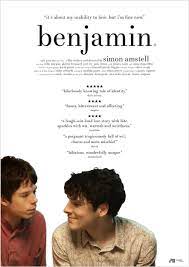
BENJAMIN
UK, 2018, 88 minutes, Colour.
Colin Morgan, Phenix Brossard, Joel Fry, Jack Rowan, Jessica Raine, Anna Chancellor.
Directed by Simon Amstell.
Benjamin could be described as a gay romance. But one screenplay is also something of an existential reflection. The director is a comedian, writer and actor.
Colin Morgan is Benjamin, a filmmaker in his 30s, some previous success, delay, putting the final touches to his new film, arguing with the actor, arguing with his producer, wanting to insert some sequences of conversation with a Buddhist monk.
Benjamin is supported by his friend Stephen, a would-be stand-up comedian (Joel Fry, character actor, Bank of Dave) and his publicist, Jessica Raine.
The film is a success except for the added Buddhist monk scenes, the public disliking them, and a satirical sequence with actual film critics, Mark Kermode and Simon Mayo in a studio attacking the sequences.
The gay romance consists of Benjamin’s encountering a French singer, Noah, Phenix Brossard studying in England, performing, meeting him, beginning a relationship, having a meal with Noah’s parents, being accosted and criticised by a previous friend, the breaking of it, the affair on Benjamin, his being approached by the star of his film who wants to write a screenplay with him, but this ends in a one night stand.
Benjamin, desperate, magic mushrooms, hallucinations about the monk, heightened concerned about his friend Stephen, taking stock of himself and reconnecting with Noah, even prepared to go to Paris to live with him.
- The title, the focus on Benjamin, age, experience as a filmmaker, the lull in his career, his relationship with producer, publicist, his new film, psychological implications, his sexual orientation?
- The London settings, flats and homes, studios, clubs, musical performances? The musical score?
- The writer-director, making a film about the kind of films he makes? Dramatic self-revelation?
- The comic touches, serious themes, career, filmmaking, psychological self-probing, self-confidence, rejection, gay orientation?
- Benjamin, watching his film, the sequence with the confrontation between the two characters, rejection? Publicity, Billie, her cameraman, the poses, discussions? The continued scenes between Billie and Benjamin, at the clubs, the premiere of the film, her meeting Stephen, her antagonism towards him?
- Stephen, stand-up comedian, friendship with Benjamin, self-confidence, lack, awkward moments with people, especially with Billie, the antagonism? The strong friendship with Benjamin, going to the screening, his reaction, speaking truthfully? Going to his performance, his failure on the stage, the object thrown at him? Benjamin, his concern, the phone calls, going to his house, he seemingly absent, breaking the window, but then the reassurance?
- Going to the venue, the singing, Noah and his performance, Benjamin and the attraction, the approach, Stephen and his support, going out for the meal, Noah coming to the end of the table, their talking, saying goodbye, Noah ringing, coming to the flat, the sexual encounter, the consequences? Know, French, studying music, responding to Benjamin, Benjamin cutting the relationship? Going to Noah’s performance, the success, the meal with his parents, Benjamin’s former boyfriend, Paul, coming to the table, the vehement attack on Benjamin? Benjamin going outside, Paul and the continued tie raid?
- Harry, in the film, at the premiere of the film? The premiere, Benjamin nervous, not wanting to go in, his awkward speech on the stage, fearing the reactions?
- The issue of the Monk in the film, the producer not wanting it, Benjamin’s insistence, the visuals of the Monk, his talk, existential issues, life and meaning? The critical attack on these sequences – and the real-life critics, Mark Kermode and Simon Mayo and the reactions?
- Harry, arrival, suggesting that he write a screenplay with Benjamin, staying the night, the sexual relationship, Harry walking out, that the night was merely a stepping stone?
- Benjamin, the result of the film, the Monk, the clash with the actor and the physical attack, the episode finding Stephen?
- His going to find Noah, Noah going back to Paris, Noah inviting him to come to Paris, Benjamin saying he had nowhere to live, his career – and then saying yes?
Zone of Interest, The
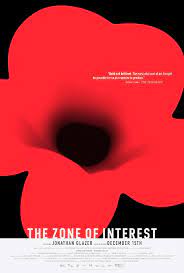
THE ZONE OF INTEREST
UK/Poland/US, 2023, 107 minutes, Colour.
Christian Friedel, Sandra Huller.
Directed by Jonathan Glazer.
Discomfit. For this reviewer, the word quickly came to mind for the experience of watching this film. More than just merely uncomfortable.
Steven Spielberg has noted that he considers this film the best on the Holocaust since Schindler’s List. But, it must be stressed, it is completely different from Schindler’s List but is also a harrowing experience. One inside the camps, the other outside.
British writer-director, Jonathan Glazer (Sexy Beast, Birth), writing his screenplay in German, draws on the novel by Martin Amis. The film begins beguilingly, a wonderful summer picnic by the river, parents, children, playful, audiences invited to share the joy. Then the family goes home, a fine house, comfortable, an extended garden, flowers and vegetables, swimming pool. that a German family might desire.
But this is in the 1940s,, the house is in Auschwitz, adjacent to the camp. The head of the household is Hoss, the commander of the camp. And this is where the experience of The Zone of Interest is the opposite of Schindler’s List. The garden wall of the Hoss house is also the wall of the camp. But, we never go inside the camp (until some final low key looking sequences where ordinary women cleaners enter the camp to sweep and mop). We notice the wall, the guard tower with the guard rising above it, the chimneys and the increasing smoke billowing. We, the audience, know what that means. The Hoss family tend not to notice anything about the camp, make some complaints about the annoyance of the smoke.
And that is the discomforting aspect of the film. On the one hand, we are looking at family life, the ordinariness of it, the wife (the excellent Sandra Huller, Anatomy of a Fall), high demands and expectations for a comfortable life, showing the extensive garden to her mother, plans for the future. At this stage, many in the audiences will reminded of Hannah Arendt’s comment about the banality of evil. It is there in the contrast between the commonplace and intimations of overwhelming evil before our eyes in this film.
Our level of discomfit will depend on our awareness, memories, films and documentaries, the visuals of the Holocaust, the trains to the camps, the prisoners, the Star of David labels, the workforce, the huts, the opens, the gas… For older audiences with memories, this will be very strong. For younger audiences, there may not be this awareness, the film is a challenge.
Jonathan Glazer relies on our supplying the atmosphere of discomfit.
The Commandant, Hoss, seems an ordinary type at first (except for an extreme Nazi haircut) but he is shown discussing with some visitors a new plan for the camp, greater efficiency for heating and cooling the ovens, then at a meeting with a final solution agenda, his being transferred to Berlin (and his wife not willing to sacrifice the house in a move), his logistics for the daily trains to bring Jewish prisoners from Hungary, a scene at a Nazi banquet where he roams up and down, contemplating concentration Issues, speculating how those inside might be most effectively gassed.
Nominee for Academy Awards International Best Film, winner at the Festival of Cannes, highly recommended no matter how much the discomfit.
- Based on the novel by Martin Amis? Expanded by the imagination of the writer-director? The 21st-century, audience knowledge of Auschwitz, of the concentration camps, of the atrocities, the Holocaust and the Jews? For older audiences? Younger audiences and familiarity/non-familiarity?
- The impact for the audience, the focus on the Hoss family, their lifestyle? Very ordinary at home? The initial indications of the concentration camp, the wall, the tower and guard, the sounds, shots, cries, the increasing billowing smoke, flames? They’re not making much impact on the family?
- Discomfit for the audience, watching the family and its detail, the indications of the violence and brutality in the camp, detail after detail of the family life and their disregard for the camp? The gradual introduction of scenes within the camp, of the commandants of the camps, their meeting, and the social gathering in Berlin?
- The British perspective on the issues? German language? German cast?
- The idyllic introduction to the family, summer, the water, swimming, the picnic, playful? The return home? Life at home, husband and wife, the range of children under age, the servants in the house, the treatment of the servants?
- The portrait of the commander, age, appearance, the haircut, uniform, but mainly seeing him at home, his white suit, at the table, putting the children to bed, the devoted father? Husband? But the later encounter with the servant and his going through the tunnel to wash?
- The wife, age, Germanic in her commands, the fur coat and its origins, her looking in the mirror, her meeting with the other mothers, their discussions, especially of confiscated Jewish clothes, disappointment at missing out on desired curtains at auctions…? The arrival of her mother, the complete tour of the house and its comfort, the bedroom, the tour of the garden, the flowers, the vegetables, the vastness, the swimming pool? The mother and her joy and success for her daughter? Her later being disturbed by the sounds of the camp, the smoke, her disappearance in the night? Her daughters being slightly upset?
- The issue of the transfer, the impact on Hoss, not telling his wife immediately, the sequence of his telling her, her reaction, not wanting to leave the house, the investment in it, absence from her husband? His dictating the letters, her suggesting the appeal to Boorman, to Hitler? His transfer, going to the meetings, organising the table and the delegates from the various concentration camps, his agenda? Business, no emotion? No inherent sense of morality?
- The Hungarian issue, the number of Jews, the government, the logistics for the transfer, 12,000 per day, the trains, the number of passengers, arrival of the camps, selection for work, the gas chambers?
- The visit of the technician, explanation of the improvements for the ovens and circulation, heat and cold, called objectivity in presenting these death centres? Hoss and his later congratulating them on their ingenuity?
- Hoss and his phone calls to his wife, the middle of the night in her seeming disregard, the prospect of his return?
- The banquet and ball in Berlin, his observations, speculation about the possibilities of gassing so many people in this kind of room? His wandering the corridors, being sick? And the insertion of the memories from Auschwitz, the ordinary women cleaners, coming into the camp, vacuuming, sweeping, cleaning the windows with the display of shoes, crutches, and the photos along the corridors honouring those who work there?
- The cumulative discomfit watching the film, remembering Hannah Arendt in the banality of evil as the family lived their ordinary life, taking Auschwitz for granted, the Nazi loyalties, uniforms, the troops assembling and wishing happy birthday to the commander, the young son and his Hitler youth uniform, the bone in the river and the family having to wash themselves clean?
- A chilling reminder of the Holocaust, the extermination of the Jews, Aryan ideology, the concentration camps and the terror, and the fears loyalties of the German people to Hitler and the Reich, its philosophy, its extermination?
T Blockers
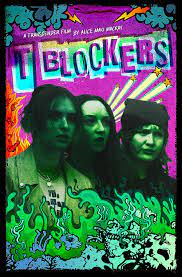
T BLOCKERS
Australia, 2023, 74 minutes, Colour.
Lauren Last, Lewi Dawson, Etcetera Etcetera, Lisa Fanto, Joni Ayton-Kent, Stanley Browning.
Directed by Alice Maio Mackay.
Writer-director, Alice Maio Mackay, has considerable talent. Understatement.
At age 16, she was writing and directing short films. At 17 and 18, she was writing, producing and directing three short feature films including T Blockers. She exhibits a 21st-century sensibility, but memories of horror films from the 20th century, hard rock musical styles, but, and this is one of her principal intents, to make films with a queer sensibility, trans sensibility, reaching out to this target audience.
Her films have appeared at various festivals, queer festivals, monster-film festivals…
With a greater release in Australia and availability, audiences interested in the filmmaker, her perspectives, her cinematic creativity, will have a chance to respond and make up their minds.
At the basis of the film is an echo of Invasion of the Body Snatchers, strange creatures emerging, black and slimy, taking over people, especially men, spreading harsh, violent, homophobic aggressive attitudes and behaviour.
However, at the centre are Sophie and Spencer, some domestic scenes of Sophie, a writer, creating the film, Spencer best friend. While there are sequences which might be considered “realistic”, especially Sophie having a visit from her sympathetic brother, later visit from her policeman father inquiring how she is, and Sophie working as a cleaner at the theatre, dates, there is an intercutting of the horror into the ordinary. Clearly, this requires a great deal of concentration on the part of the audience to appreciate Who’s Who and What’s What.
The film opens with a trans character, a performer, Et cetera Et cetera, from Rue Paul’s Drag Race Down Under, reminding audiences of the Rocky Horror Show, tantalising the audience with the reminder that they are watching a movie, that it’s only a movie… Et cetera Et cetera reappears at various stages of the film with this reminder.
So, very much a specialist film for its intended audience.